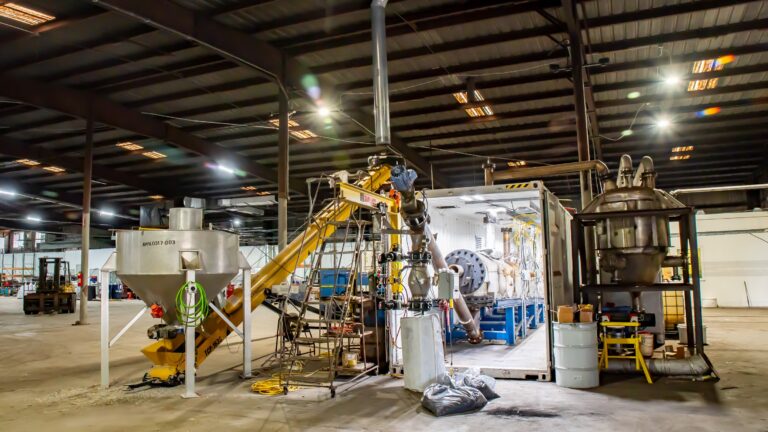
Solving the problems of pyrolysis
AHFL’s process is the first of its kind not to require use of a catalyst or incineration, and solves the decades-old environmental, practical and commercial issues associated with pyrolysis – the process commonly used to break down plastic.
This technological innovation will enable AHFL’s plant to operate continuously, working to eliminate plastic waste, while producing alternative fuel in a cleaner, greener, commercially sustainable manner. And, unlike almost all other attempts to make fuel from waste plastic, this process is profitable with a capital payback estimated to be as short as 18 months from the start of production.
The technology has been evaluated by leading engineering firm, Wood PLC, through extensive testing at AHFL’s prototype plant in the United States, which enabled a detailed and comprehensive report confirming Proof of Concept.
AHFL was founded by Brian Ablett, a Canadian inventor and entrepreneur. The company’s genesis was in a previous product co invented by Ablett in the wake of the Exxon Valdez and Deepwater Horizon oil spill disasters that can very quickly and cheaply contain and remove oil from water and other surfaces.
Turning waste plastic into fuel
Ablett was introduced to an American company that was developing a technology to make soil enhancers from organic materials. Through a period of experimentation, Ablett convinced the American company to turn its attention to the world’s most problematically abundant source of energy: waste plastic.
AHFL CEO Brian Ablett said: “AHFL is the solution to a problem that scientists and businesses have been attempting to solve for years without success. We have created a cheap, clean, efficient, safe, continuous and commercially viable process to turn mixed, end of life waste plastic, the scourge of our environment, into multipurpose fuel that is cleaner than the fossil fuels on which most of the world still relies. It’s not just good for the environment, it’s good business.
“For the past two decades we have witnessed countless attempts to turn plastic into energy through pyrolysis, and other non-commercial, non sustainable processes, and these have invariably proven inefficient, expensive, unproductive or even downright dangerous. AHFL will allow us to divert our energy away from these problematic processes and towards the creation of products with multiple essential utilities and a fraction of the environmental impact.
“We have pinpointed the UK for the first AHFL plant because of this country’s world leading standards. We know that AHFL ‘s technology can reduce our use of fossil fuels, help the UK reach emissions targets and have an immensely positive economic impact.”
Technological innovation
Evan Erskine, former Senior Process Engineer at Wood PLC said: “The AHFL point of difference is this technological innovation, which allows the breakdown of plastic into a petroleum product similar to a diesel fuel. AHFL has proven the technology concept and is ready to move to the next phase, which is the construction of a commercial scale demonstration plant.
“The alternative fuel market is flooded with companies that claim to produce fuel from plastic in a sustainable manner, but very few are able to deliver in terms of profitability.”
AHFL’s process breaks down plastic through energy-efficient ‘gasification’, at a much lower temperature and without the harmful emissions associated with incineration and other forms of extreme heating. Notably, AHFL’s system does not require a catalyst, ensuring the process does not emit the same hazardous chemicals typically released through catalytic pyrolysis.
Usable products
AHFL’s proprietary time-temperature and atmosphere control system, allows the use of any kind of plastic feed stock, including post-industrial plastics, to be broken down into several usable products:
- 60% Keroclean®: a middle level distillate that can be used to power marine and industrial engines, with preliminary testing indicating potential as a blend with aviation fuel. When mixed with 70% diesel,
Keroclean® can power land vehicles, with lower emissions and at a reduced cost than diesel alone. Previous pyrolysis-based processes produce only 40% fuel at best.
- 35% Recycled Gas Power: This gas provides 90% of the energy required to run the AHFL process, making the technology practically self-sufficient and almost off the grid.
- 5% Concrete Building Ash: The ash output of the AHFL process can be used to make concrete and road paving materials, meaning the system produces minimal waste.
A fully operational AHFL line can process over 2 metric tonnes of waste plastic per hour, producing 57,600 litres of fuel every day, for 360 days a year, amounting to almost 2″1 million litres of fuel per line per year.
The AHFL process is designed to comply with even the strictest environmental and health & safety regulations, including those in the UK. A regulation-compliant UK plant would serve as a blueprint for AHFL to build regulatory-compliant plants anywhere in the world.
AHFL is now seeking funding to build its first full-scale commercial demonstration line in the UK, followed by the installation of additional lines growing to multi-line plants around the world. An investment of
£10m would allow AHFL to build the first commercial line, make final enhancements to its cooling and scrubbing systems, source plastic from post-industrial and/or post-consumer partners, complete “1,000 continuous hours of testing, secure RSB certification, and launch commercial production at speed.